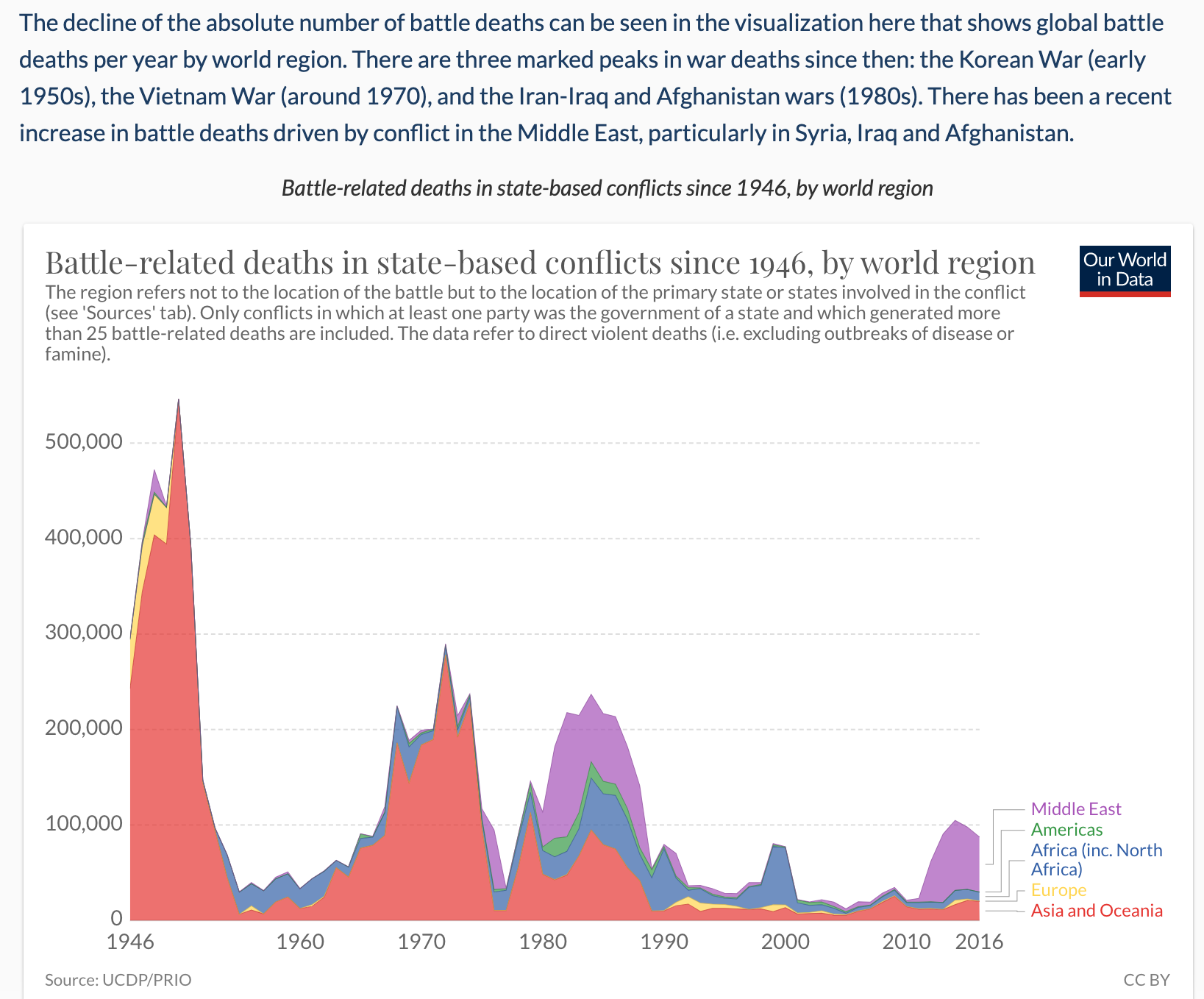Author Steven Pinker's observation, that the world is less violent now than ever in human history, is probably true.
Contrarianism is a tricky thing. Challenging the conventional wisdom – something ACSH routinely does – is necessary because popularly held beliefs are often wrong.
The keys to a successful contrarian argument are convincing data and solid logic. Even if ultimately unsuccessful, a powerful contrarian argument at the very least challenges people’s assumptions and forces them to defend their conclusions. This, in theory, makes us all smarter.
But, like anything, contrarianism (for the sake of contrarianism) can be taken too far. The biggest offender is the website Slate, which has a notorious penchant for defending ludicrous claims with bizarre arguments in articles that are capped off with clickbait headlines. The website once fretted that self-driving cars would pose a problem to society because there won’t be enough dead people from car accidents to donate organs.
Foreign Policy magazine (FP) occasionally dabbles in contrarianism, usually the good kind. I subscribe to (and have written for) FP because its clever analysis sprinkled with humor makes it a worthwhile read for those who are interested in international affairs. But a recent contrarian piece the outlet published falls short.
The article, titled “Is the World Getting Safer?”, attempted to refute an argument largely popularized by Steven Pinker, who claimed in his book The Better Angels of Our Nature that the world is getting better and safer and that, essentially, we’re living in the least violent, most peaceful period in human history. Others, such as economist Max Roser, agree with his analysis. So do I.
The authors of the article apparently disagree, and they reviewed a book called Only the Dead by Bear Braumoeller, which challenges the view espoused by Pinker and Roser. The argument can be summarized as follows: It is true that the world has become safer since World War II, but it could be that the previous 75 years of (relative) peace are an anomaly. Over the past 200 years, conflicts have become more not less common, and any given conflict can spiral out of control. (That’s how World War I started, after all.) Given those facts, a devastating World War III cannot be ruled out, and Dr. Braumoeller gives such an outcome a roughly 1 in 200 chance. Ergo, Dr. Pinker and the Pinkerettes are wrong.
The article is thoughtful and evidence-based, but what caught my eye is the subheadline (which an editor, probably not the authors themselves, wrote): “New research debunks the theory that wars are becoming less deadly and less frequent.” That statement is really misleading.
Not to be a nitpicker, but there’s no “theory” here to debunk. It’s simply an observable fact that wars have become less deadly since World War II. The screenshot below, which depicts battle-related deaths since 1946, is from Dr. Roser's site Our World in Data. Indeed, even with the recent spike in deaths due to the Syrian civil war, it is indisputably true that fewer people are being killed in wars.

What about the authors' claim that the number of conflicts has increased over the past 200 years? It could be true, but it's hard to know. With things like satellites and the internet, we know much more about what's going on in the world today than ever before. We also have more records from the 1800s than the 1400s. But let's just assume they're right. The most appropriate conclusion to be drawn is, as Dr. Roser writes, that we are experiencing "a greater number of increasingly less-deadly conflicts."
Why? There are a lot of reasons. The world's "great powers" don't go to war with each other anymore. Weapons are more accurate. The global economy is highly integrated, so war isn't desirable. Ethics have changed. Even dictators are hesitant to kill civilians because they get bad publicity.
Another facet to Dr. Pinker's argument is that homicide rates have fallen, as well. According to the authors, Dr. Braumoeller does not dispute this. Overall then, Dr. Pinker seems to have the stronger argument.
Assuming the authors accurately depicted Dr. Braumoeller's book, it appears to me that the biggest point of contention with Dr. Pinker is with regard to the future: Dr. Pinker implies that societal trends will cause conflict to fizzle away, while Dr. Braumoeller believes there's no good reason to conclude that. Other smart people, such as geopolitical analyst George Friedman, are probably likelier to agree with Dr. Braumoeller. In his book The Next 100 Years, Dr. Friedman predicts that the U.S. will go to war with Japan again.
Who's right? We'll have to wait and see. As the saying goes, "It is difficult to make predictions, especially about the future."

